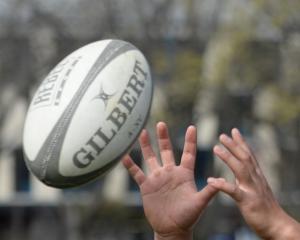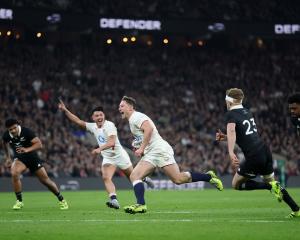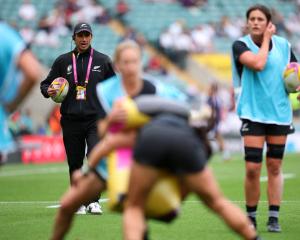If the only constant in life is change, then the top management of rugby in Otago has been a model of stability over the past year.
There have been six changes around the Otago Rugby Football Union board table in the past 12 months, while the Highlanders board has also undergone transformation.
The chairmen of both boards have gone, long-serving board members have gone, country delegates have gone.
But what, and who, have driven the changes?
Clubs? Money? Non-performance on the field? Or just natural attrition?
Like most things in rugby, it is all about interpretation.
Some people and clubs were clearly not happy with the ORFU board's direction and wanted some changes. But others believe people were moving on of their own accord.
The New Zealand Rugby Union wanted some changes at the Highlanders, and as it was effectively going to pay the bills, it got its way.
Chris Rowe, who has just stood down as Pirates chairman after 16 years, said there had been a demand for something to happen to the Otago board.
"I think there has been a degree of a wish for change. In rugby, like in business, you have so many years to succeed and if you don't then you've got to be replaced," Rowe said.
Rowe said there were some meetings of clubs in late 2008 and, though there had been none since then, that period had signalled the need for change.
"I think there has been a consequence of that and a demand for change. Of course, some of them were standing down and for various reasons did not want to stand again.
"Ultimately, the board is where the buck stops. If they do not succeed, they have to pay the price. I do believe, though, there may have been too many changes and for the sake of continuity we need to have people stay there."
Dunedin club captain Andrew Rooney has just been voted on to the ORFU board as the representative of the rugby council, replacing Brent Rodger on a 6-5 vote.
Rooney said he was compelled to take up the position after he was nominated.
"There has been a lot of frustration out there with the way Otago rugby is going, whether it might be with the board, with the players, with the coaches. But, overall, I think people are unhappy with rugby and look to things to blame. And the board is one of them, rightly or wrongly," Rooney said.
"The rule changes of rugby, particularly last year, didn't help, so you're selling a package which is not that attractive."
Rooney had been at the club meetings in 2008 and said the best thing to come out of those was getting to meet other chairmen and finding common ground.
Changes at Highlanders board level can be put down to economics, with the NZRU agreeing to underwrite the struggling franchise for the next two years.
Ross Laidlaw was co-opted from the Otago board and into becoming the Highlanders chairman.
He was the driver behind selling Carisbrook and getting that financial noose off the Otago union's neck. Through his commercial expertise he showed how important getting things right in the accounts is to the franchise.
Former Crusaders chairman Mike Eagle, also an NZRU board member, was brought on to the board too. He was chairman of the successful Crusaders franchise and was asked to bring some proven direction to the Highlanders.
With its backing of the new stadium, the Dunedin City Council got a place on the board and appointed Academy of Sport South Island chief executive Kereyn Smith as its representative.
The focus for the franchise appears to stopping the losses, both on and off the field.
With the new board having been bedded in for only a couple of months, it is a bit early to judge if it is making any impact.
Far away from the boardroom dealings at Highlanders headquarters, Balclutha mechanic Trevor Stark left his role as Otago country delegate on the ORFU board.
Stark said he decided to stand down after serving four years, wanting to pursue other interests.
But there were strong rumours he was pushed out the door after he failed to back David Latta, Balclutha's favourite son, as Otago coach last year.
"There were all sorts of stories around and there was probably a bit of truth in all the rumours. But the circumstances . . . a lot of people did not understand. Things are a bit more positive now," Stark said.
He felt the public had no real understanding of what the board did.
"With the way the union is, we really only have input into the professional side of the game. The amateur side of the game is mainly looked after by the staff.
"But it is a difficult one. The team belongs to the coach in a business sense and we can't get too much involved."
The Otago union has bled red ink over the past few years as crowd numbers have plummeted, but whether that is the fault of the board is up for debate.
Critics say the board had let the game drift along, had not tried to get money into the union to help recruit players, and had been too slow to come up with ideas to invigorate the union.
But outgoing chairman Ron Palenski said the board worked hard. In a recent interview he said many critics had no idea what the union was doing.
"That is always a problem administrators have. They deal in the reality while others deal in perception."
Whoever replaces Palenski will have a busy time. Palenski said he had worked about 15 to 20 hours a week in the post.
The race to the chairman post looks to be between deputy chairman Adrian Read and Wayne Graham.
Read put the departure of board members down to natural attrition. He said the board worked hard but members had to have a thick skin, and some people found that hard.
He said he got comments about Otago rugby every day.
"I remember when I was first appointed to the board, an old-timer said to me `when they are winning and making money you'll never get voted off. But when they start losing and no-one is turning up then you're in trouble'," Read said.
"People say we're not winning. But that has got nothing to do with the board. Look at the size of Auckland. They are 10 times as big as us and they're not winning, either.
"The board has nothing to do with the playing style. All they can do is appoint the chief executive. The staff, coaches, players have the control."
Read was involved in Otago rugby in the amateur days and said it had changed dramatically since the game went professional.
"But it all comes back to winning. And people have got to blame somebody and the board is an easy target."
Read felt players did not accept enough responsibility for their actions and performances.
"In any business there has to be some form of incentive to perform. But here, under the model we have, there is nothing like that for the players. They get paid no matter what happens. It will head that way but will take a while to get there."
Read said the union had a band of loyal sponsors but money was not easy to get out of companies.
"There are no big corporates here any more. And so many companies are owned overseas, so if they are going to put money into the country they're going to go to Auckland because that is where the market is."
Otago Rugby Supporters Club chairman Fred Cross said he rarely heard talk about the board at the club. He said all everyone talked about was the performance of the team.
"If you asked anyone they probably wouldn't even know who they [board] are. Only a few rugby union people and those in the clubs would know who they are," Cross said.
"People are far more concerned about the team and what goes on on the paddock. The board is about having people who are in touch with the realities of rugby."
Cross felt the board's role was to create the right management structure for the team to succeed.
And has the ORFU board done that?
Otago has had back-to-back seasons of finishing 10th, while the Highlanders have also been closer to the bottom of the table than the top.
Those results and the financial losses by both organisations have led to former All Black coach Laurie Mains coming back into the fold, winning a seat on the ORFU board, along with Otago District Health Board chief medical officer Richard Bunton, a former Otago lock.
Mains spoke from the heart at the union's annual meeting, saying he wanted to get things done and he was a "man of action, not of words".
He is indeed a man who gets things done and is not afraid to step on a few toes. His last involvement with the union ended in controversy after a falling-out with players and administrators, but he has the experience and record of achievement.
Mains said he was approached late last year about standing, and as Otago rugby was dear to his heart he could not say no.
Bunton was the same, saying he wanted to give something back to the game.
"Nothing is unfixable and I'm extremely motivated to work hard and reconnect with the Otago rugby public," he said at the meeting last month.
• ORFU - Board changes
In: Laurie Mains, Richard Bunton, Dave Callon, Andrew Rooney, Willis Paterson, one other to be appointed on March 8.
Out: Ron Palenski (chairman, retired), Tony Chave (did not seek re-appointment, left for business reasons), Ross Laidlaw (left to be Highlanders chairman), Brent Rodger (voted out), Trevor Stark (did not seek re-election after two two-year terms), Steve Thompson (resigned because of business reasons).
Remaining board members: Wayne Graham, John Walker, Adrian Read.
• Highlanders - Board changes
In: Ross Laidlaw (chairman), Kereyn Smith, Mike Eagle, Murray Acker.
Out: Stuart McLauchlan (chairman, left because of business reasons), Angus Bradshaw (left because of business reasons), Gary Muir (replaced by Acker as Southland representative), Malcolm Farry (left as term expired and had conflict of interest with new stadium), Steve Thompson (left because of business reasons).
Remaining members: Michael de Buyzer (North Otago), Adrian Read (Otago).











